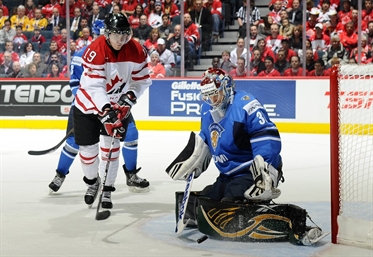Canada, Finns go for gold game
Canada, Finns go for gold game
Winner to play Sunday evening for U20 title

 Canada defeated Finland in the last World Junior encounter two years ago in Calgary. Photo: Andy Devlin / HHOF-IIHF Images
Canada defeated Finland in the last World Junior encounter two years ago in Calgary. Photo: Andy Devlin / HHOF-IIHF Images
The last Finnish victory occurred on December 30, 2001, in the preliminary round of the 2002 World Juniors. In fact, since the U20s went to a playoff format in 1996, Canada has been eliminated by the Finns only once, in 2001.
There will be several factors which will decide who wins and who goes to the bronze-medal game, not the least of which is odd-man situations. Finland’s power play has been unimpressive, scoring only four goals on 22 chances so far.
So, how did they get to the semi-finals? Penalty killing. They have allowed only one power-play goal all tournament and have the second-fewest penalties as well (behind only the USA).
As a result, if Canada is going to win, it will have to do so either by doing what other teams have been unable to do (draw penalties and capitalize) or play superior hockey at 5-on-5.
On the other hand, Canada has scored seven extra-man goals in five games, good but not sensational, and allowed five as well, a middling 75% rate of success. The Canadians would be happy to make the tradeoff and not let penalties decide the game at all.
Tellingly, the top four scoring teams in 5-on-5 play are the teams left in the semi-finals: Sweden has 17 goals, Canada and Russia 16, Finland 15. Just as revealing, the lowest-scoring teams 5-on-5 are the two fighting in the relegation round (Germany with 5 and Norway with only 3).
Both Canada and Finland have allowed only 13 goals, but their goaltending has distinctly different features. The Finns have gone most of the way with Juuse Saros, who has a sparkling 1.67 GA. He has been one of the reasons the team has come as far.
Continue readingCanada ran into goaltending trouble early and had to switch from Jake Paterson to Zachary Fucale, but Fucale has embraced the starter’s role and been an integral part of the team’s improvement over the last few days.
“We had a practice game against them,” Saros said of Canada. They’re a highly skillful and hard-working team. They’re a really good team.”
The Finns have been the less consistent team. They won an easy game against Norway, lost a close one to Sweden, followed with a big win over Russia, lost to the weaker Swiss in a shootout, and then trailed the Czechs 3-1 late in the second period before rallying for the win in the quarter-finals.
The Canadians had an easy game against Germany to start and then played its worst game, a 5-4 shootout loss to the Czechs. But since then, they have won three in a row, found their goalie, and capitalized on their chances. Whereas Finland has yet to find its consistent stride, Canada has done what every coach wants his team to do in a short tournament – improve every game.
That improvement is directly related to several factors. For starters, Anthony Mantha has emerged as a bona fide threat when he is on the ice. Big and strong with nice scoring touch around the goal, he is tied for the tournament lead with eleven points (with Filip Forsberg of Sweden).
Canada’s defence now boasts both Aaron Ekblad and Griffin Reinhart, meaning that coach Brent Sutter can have one of them out there most of the game. They are a formidable wall on the blue line and have been integral in minimizing scoring chances on Fucale.
For Finland, if the idea is to stop Mantha to win, the team must also rely for offence from the combination of scorer Saku Mäenalanen and passer Teuvo Teräväinen. The former has scored in every game but one, six goals in all, and Teräväinen has assisted on five of them. In all, Teräväinen leads all players with nine assists (no goals), while Mäenalanen leads all players with six goals and is in the top ten of scoring with seven points.
Teräväinen played the U20 last year when the team finished a disappointing seventh. “Last year was such a big disappointment,” he said after the quarter-finals victory. “I didn’t want to do that again. It’s a big win for me, of course. I’m the captain of this team and I try to show leadership.”
On matching up against Canada, he is not daunted. “Canada’s a very good team, of course,” he said. “Every year they’re a big team. They haven’t won now for a couple of years. They’re hungry, I think. We maybe have smaller guys, but we have a lot of intensity. We play 100 per cent every game. It doesn’t matter how big you are if you play hard and really want to win.”
Back to Overview































































